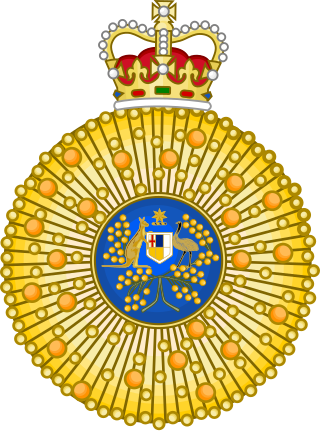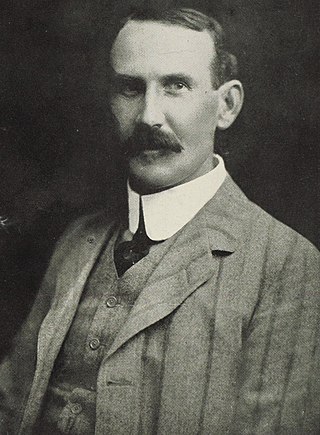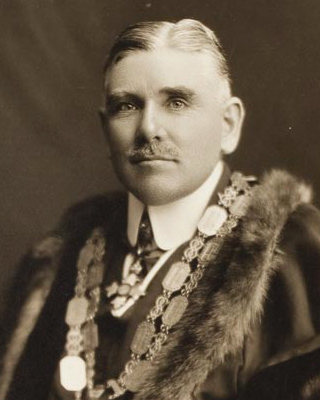Knight Bachelor
- James Hugh Buchanan Coates – of Wellington; a member of the board of directors of the National Bank of New Zealand.
- John Ross – of Dunedin. Has taken practical interest in educational and philanthropic work.
- Sir James Coates
The 1922 New Year Honours in New Zealand were appointments by King George V on the advice of the New Zealand government to various orders and honours to reward and highlight good works by New Zealanders. The awards celebrated the passing of 1921 and the beginning of 1922, and were announced on 2 January 1922. [1] [2]
The recipients of honours are displayed here as they were styled before their new honour.

The Order of Australia is an Australian honour that recognises Australian citizens and other persons for outstanding achievement and service. It was established on 14 February 1975 by Elizabeth II, Queen of Australia, on the advice of then prime minister Gough Whitlam. Before the establishment of the order, Australians could receive British honours, which continued to be issued in parallel until 1992.

The 1922 New Zealand general election was held on Monday, 6 December in the Māori electorates, and on Tuesday, 7 December in the general electorates to elect a total of 80 MPs to the 21st session of the New Zealand Parliament. A total number of 700,111 (87.7%) voters turned out to vote. In one seat there was only one candidate.
The following lists events that happened during 1921 in New Zealand.
The following lists events that happened during 1922 in New Zealand.

The 1926 Eden by-election was a by-election for the Eden electorate during the 22nd New Zealand Parliament. The seat became vacant after the appointment of the sitting member, James Parr of the Reform Party as High Commissioner to London. Parr resigned on 26 March. Labour won the by-election and became the official opposition in Parliament.

Sir Christopher James Parr was a New Zealand lawyer and politician of the Reform Party. He was Mayor of Auckland, a Member of Parliament representing the Eden electorate, a Minister in the Reform Government, High Commissioner in London and a Member of the New Zealand Legislative Council.
Kaipara is a former New Zealand parliamentary electorate north of Auckland that existed from 1902 to 1946, and from 1978 to 1996.

The 22nd New Zealand Parliament was a term of the New Zealand Parliament. Its composition was determined by the 1925 election, and it sat until the 1928 election.

Sir James Henry Gunson was a New Zealand businessman and Mayor of Auckland City from 1915 to 1925. He was knighted in 1924.

Sir James Hugh Buchanan Coates was a New Zealand banker and keen sportsman. He was the general manager of the National Bank of New Zealand for 21 years before retiring from that role in 1914, moving to London and becoming a company director.
The following lists events that happened during 2016 in New Zealand.

The 1921 Auckland City mayoral election was part of the New Zealand local elections held that same year. In 1921, elections were held for the Mayor of Auckland plus other local government positions including twenty-one city councillors. The polling was conducted using the standard first-past-the-post electoral method.
Lyn Gunson, also known as Lyn Parker, is a former New Zealand netball international and a former head coach of both the New Zealand and England national netball teams. She captained New Zealand when they won the 1985 World Games title and coached them when they retained the same title in 1989. In 1989 she was named New Zealand Coach of the Year. Between 1999 and 2008 Gunson also served as head coach and/or director of netball for Team Bath, guiding them to Netball Superleague titles in 2005–06 and 2006–07.

James John Clark was a New Zealand politician. He served as mayor of Dunedin from 1915 to 1919.
The 1926 New Year Honours in New Zealand were appointments by King George V on the advice of the New Zealand government to various orders and honours to reward and highlight good works by New Zealanders. The awards celebrated the passing of 1925 and the beginning of 1926, and were announced on 1 January 1926.
The 1924 King's Birthday Honours in New Zealand, celebrating the official birthday of King George V, were appointments made by the King on the recommendation of the New Zealand government to various orders and honours to reward and highlight good works by New Zealanders. They were announced on 3 June 1924.
The 1923 New Year Honours in New Zealand were appointments by King George V on the advice of the New Zealand government to various orders and honours to reward and highlight good works by New Zealanders. The awards celebrated the passing of 1922 and the beginning of 1923, and were announced on 1 January 1923.
The 1921 King's Birthday Honours in New Zealand, celebrating the official birthday of King George V, were appointments made by the King on the recommendation of the New Zealand government to various orders and honours to reward and highlight good works by New Zealanders. They were announced on 3 June 1921.
The 1921 New Year Honours in New Zealand were appointments by King George V on the advice of the New Zealand government to various orders and honours to reward and highlight good works by New Zealanders. The awards celebrated the passing of 1920 and the beginning of 1921, and were announced on 1 January 1921.
The 1943 New Year Honours in New Zealand were appointments by King George VI to various orders and honours in recognition of war service by New Zealanders. The awards celebrated the passing of 1942 and the beginning of 1943, and were announced on 1 January 1943. No civilian awards were made.